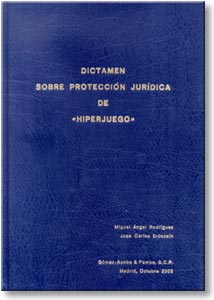|
By way of preliminary conclusions, and not to the detriment of
what will be said later on as legal proof, we provide the
following legal protection report on Hiperjuego and Shop2win:
|
a. |
Both Hiperjuego and Shop2win stand for an innovative
consumers' loyalty system. |
|
 |
|
Click on the right button on your mouse
and select SAVE AS to download the PDF
of the legal report. |
|
|
b. |
As a result of being conceived as an original idea,
HIPERJUEGO and Shop2win, are protected under
international copyright and legal conventions. |
|
c. |
The originality of HIPERJUEGO lies in many aspects
which can be summarised as follows: a loyalty card
with an innovative and fixed design allowing the
user to get cash prizes. Those prizes will be based
on the well-known National Lottery, EuroMillions,
pools coupons and many other lottery draws. We also
have some other patents explaining the basis of the
HIPERJUEGO prizes programme in some other countries,
namely: BigGame and PowerBall draws in the USA,
Lotto in the United Kingdom and Germany, Loto in
France and Italy and finally, Loto and Totoloto in
Portugal. Prizes will be proportionally shared among
the card holders in a group (those having
identical bets on their cards) and also according to
the amount of points they have obtained during a
certain time (principle of loyalty). Thus,
the ones using their cards the most will get the
biggest share of the prize at the expense of those
who do not use it as much (different and dynamic
groups) |
|
d. |
The variety of designs for the HIPERJUEGO loyalty
programme along with the rules of the game guarantee
its originality. These participation rules are the
essence of the programme´s originality and
customers’ loyalty. Basically, we can say that these
rules vary depending on the different versions of
the programme for the various commercial sectors it
will be applied to. Therefore, we carried out
several surveys on the following areas: Banking
(banks and savings banks), Phone companies,
Distributors, Shopping Centres, Supermarkets, Petrol
station chains, News and sports papers, Cinemas,
Restaurants and, finally, Hotels. The rules of the
game motivate the consumers with free lottery bets
printed on the back of their Shop2win cards. Users
will belong to a group (sharing the same bets) and
their share of the prize will vary depending on how
much they have used their card. The forecast of
prizes will be worked out through a highly complex
computer programme and the daily results for every
card holder will be published on the internet every
night).
The three biggest lottery prizes will be shared
weekly by the consumers and the rest of the prizes
will be accumulated in order to have a final special
jackpot for all the users. To sum up, we could say
that the innovative side of the loyalty programme of
HIPERJUEGO (Shop2win) lies in the fact that it gives
consumers free lottery bets printed on their
personalised cards and that they can turn it into
cash prizes depending on their loyalty, i.e. on how
much they use their cards |
|
e. |
HIPERJUEGO (Shop2win) is protected under the laws
and regulations established in patent rights. Above
all, HIPERJUEGO holds this legal protection for the
design of the cards used in the loyalty programme
without detriment to the most specific protection in
trademarks and in any other distinctive signs of the
companies which will be using it. |
|
f. |
Finally, the originality and consequent legal
protection of HIPERJUEGO is
supplemented
with the contractual rules about the transfer of
rights.
They authorise the owner of the rights to prosecute
any crimes against the possession of those protected
rights. In this sense, the use of HIPERJUEGO
(Shop2win) is likely to be licensed by means of
contracts of authorised rights. The unauthorised use
of the programme HIPERJUEGO is protected by means of
civil and criminal actions. The civil actions
qualify the rightful owner of the patent right to
forbid the use of HIPERJUEGO and to destroy any of
the illegal elements of use and also to receive any
compensations for the damage caused. Criminal action
will be only exerted onto those who may commit
serious or continuous offences. In those cases,
imprisonment and strong financial sanctions will be
applied. |
|